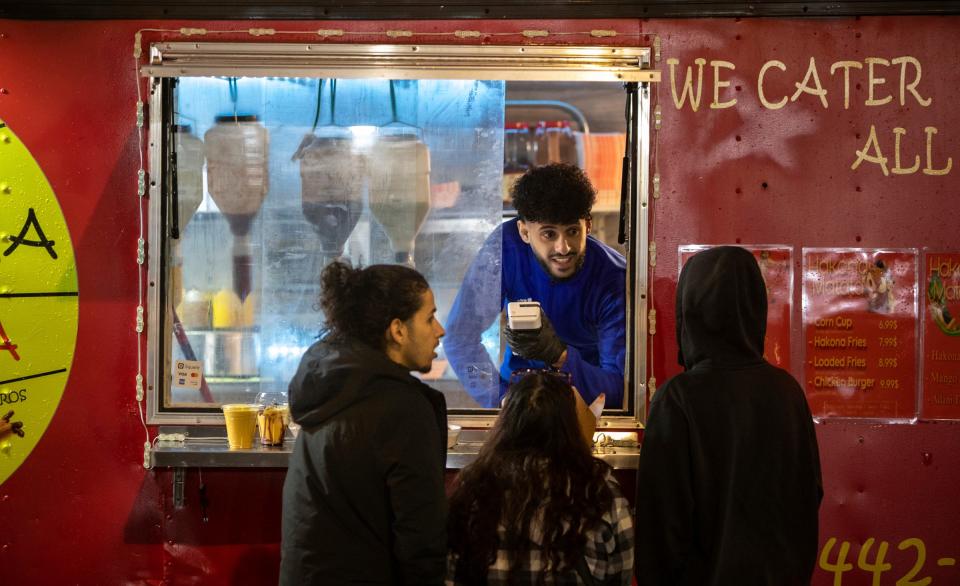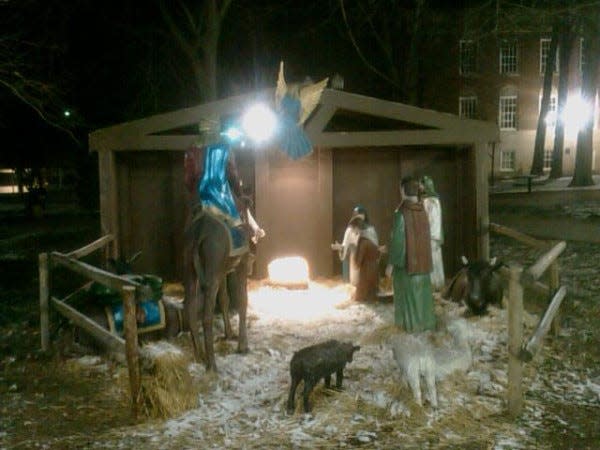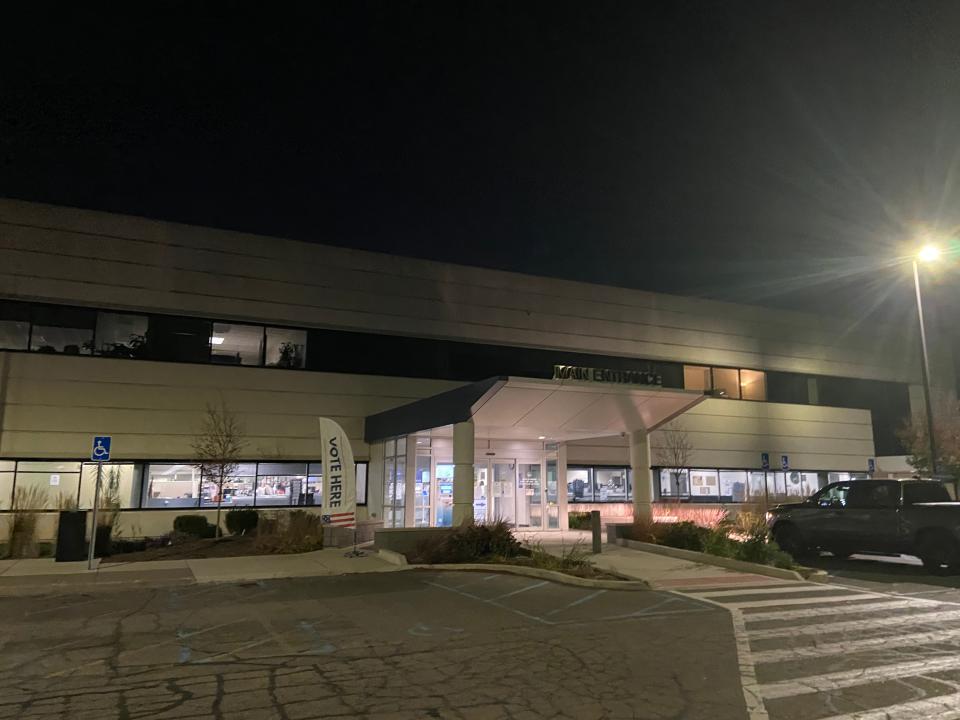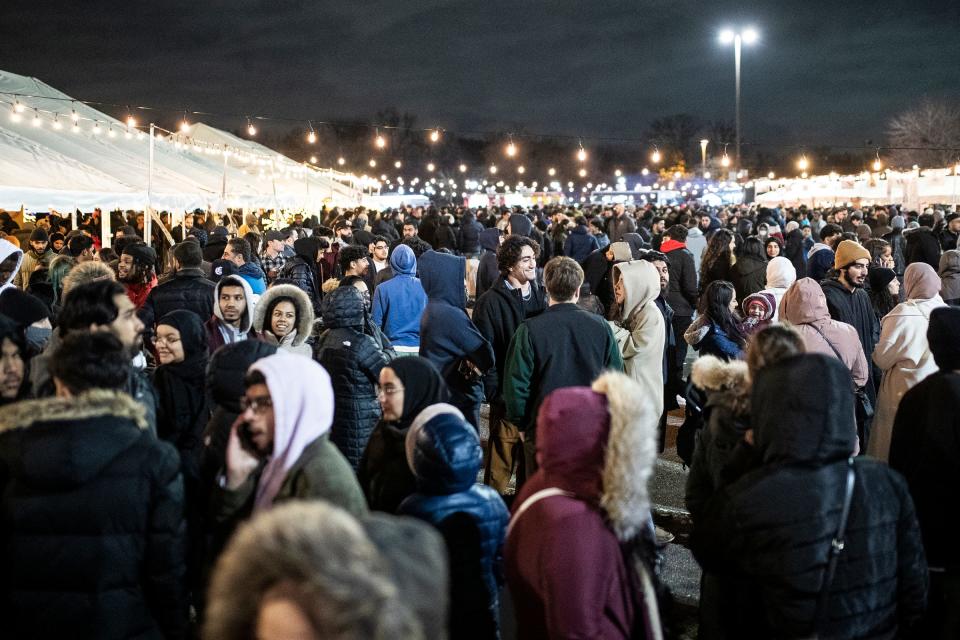Dearborn makes history with Eid, Ramadan observances
After 10 p.m. on a recent Saturday night in Dearborn, crowds started to form around the downtown area in the western part of the city near Michigan Avenue. Organized by city officials for the Islamic month of Ramadan, a row of food trucks under bright lights sat along West Village Drive as some huddled around open fire pits, kids played outdoor games and families posed for photos behind a large crescent and star symbolizing Islam.
"It gives you a sense of community, a sense of celebration," said Manal Hussein, of Dearborn, in between bites of a halal cheeseburger she got from a Famous Hamburger food truck. "I love it. It's so nice ... celebrating the month of Ramadan. It's just beautiful."

The bustling scene this month is one example of how the city of Dearborn is celebrating and promoting activities tied to the month of Ramadan, when observant Muslims traditionally fast from food and water from sunrise to sunset, then often meet up with others at night for a bite before the next sunrise.
There have been privately run Ramadan late-night festivals previously that are continuing this year, and many restaurants in Dearborn have stayed open late for years during the holy month. But this year marks what is believed to be the first time Dearborn's city government has helped organize or support city events for Ramadan and Eid al-Fitr, the holiday marking the end of the month that occurs next week.
Officials and Muslim advocates say that some of the ways the city is marking Ramadan are historic firsts in the U.S.
"There's no such precedent of this anywhere else in America," Dawud Walid, executive director of the Council on American Islamic Relations Michigan, told the Free Press. "These observances represent the acculturation of Islam in our region."
Dearborn's population is now more than 47% Arab American, most of them Muslim. Mayor Abdullah Hammoud took office last year as the first Arab American and first Muslim to lead the city, and he's putting his stamp on how the city marks holidays. Hammoud has continued and expanded the city's Christmas celebrations, putting up a bigger tree in November. And now, he has launched a series of events for Ramadan amid a debate in the city over how to mark religious festivals. Dearborn and Hamtramck have the highest percentages of Muslim residents among cities in Michigan.
"This is the city's first year of activating West Village Drive for the Ramadan season," Angela Fortino, the city's deputy director for economic development, explained as visitors strolled by the food trucks on April 1. "Typically, the space is used for our summer market, which is artisans and farmers, and activated for movies and music nights and around Christmastime. Given the interests of the local population, culturally, religiously, we felt it was important to also celebrate what the community is about."
The city announced in a news release last month its first-ever "Ramadan Nights in West Downtown Dearborn," for Thursday, Friday and Saturday nights during Ramadan. The city then announced in a separate news release it will shut down on Eid al-Fitr, April 21, its city hall offices, Dearborn's public libraries and the 19th District Court. This will be the first time in the history of the U.S. a municipality's offices will be closed in observance of Eid, Walid said.
The Ramadan festival is also a first for a city, he said. Dearborn has in previous years closed its offices for the Christian holiday of Good Friday, which continued this year. Some school districts have been closed for Eid for years, including in Dearborn, Detroit, and Dearborn Heights, among other places in Michigan and across the U.S. Hammoud proposed Ramadan Nights and shutting down city hall for Eid to city council, which approved them, Council President Mike Sareini told the Free Press.
"The mayor talked us about that in a briefing before he brought it forward," Sareini said of the proposal to close for Eid. "I thought it was a very good idea. He coordinated with other religious faiths. ... I thought it was very good message of unity."
Dearborn then announced this month it will have a community Eid breakfast with Hammoud on April 22 at the city's Ford Community & Performing Arts Center "sponsored and supported by local businesses, including Family Bakery, Qawah House, and the Amity Foundation." The city said tickets for the breakfast have already sold out. In addition, the city has a Dearborn Aglow Spring program that recognizes homes decorated for the Ramadan, Easter or Passover holidays.
Other events Hammoud and the city held recently that reflect Dearborn's diversity was a watch party in December the city organized in support of Morocco competing against France in the semifinals of the World Cup, and next month, the grand marshal of the city's Memorial Day parade will be a Muslim woman, Air Force Captain Maysaa Ouza, for the first time.
Debate over religious events in Dearborn
While the city's moves are celebrated by many residents, there have been grumblings from some who are more conservative in their religious beliefs. It's part of an ongoing debate among Muslims in the U.S. as to how best celebrate their holidays without compromising their beliefs.
Others have raised concerns about the issue of separation of church and state. In the 1980s, the American Civil Liberties Union had filed a lawsuit against Dearborn to remove its nativity scene placed outside the City Hall building; a federal judge ruled in the ACLU's favor in 1983, but the case was appealed and the depiction of Christ's birth stayed up for decades until the city hall offices moved. The city in 1984 sold the slice of land where the nativity scene was to a private developer to avoid legal liability.

In 2018, the Ramadan Suhoor Festival — named after the meal Muslims eat before sunrise during Ramadan — was started in Dearborn Heights by businessman Hassan Chami and continued the next year until COVID-19 hit. It started up again last year, moving to Dearborn under tents in the parking lot at Fairlane Town Center, charging visitors $1 each for admission. While not a city event, the festival was supported by Hammoud and the council.
One of Hammoud's uncles, Imam Ahmad Hammoud of the Islamic Center of America, a prominent Dearborn mosque, criticized the festival last year in a sermon, alleging some people who attended were acting in ways contrary to Islam. He made some unspecified allegations of drug use; there have not been official reports of such activity at the festival. Some argued Ramadan should be more about prayer and Quran reading rather than eating food and socializing in crowds of mixed genders.

The Ramadan Suhoor Festival established last month a code of conduct in accordance with Islamic beliefs, asking visitors to follow the code or else face removal. They include: dressing modestly, no music, no alcohol, no smoking, no profanity and no guns at the festival that includes numerous food vendors.
"The essence of fasting during Ramadan is to abstain, not merely from food and drink, but from all which all invokes God's displeasure," read the code posted last month on the festival's Instagram page.
Adding to the controversy over the Ramadan Suhoor festival is the fact that Chami has been a leader in Dearborn fighting against some LGBTQ books in Dearborn Public Schools that he said were too explicit for kids. In recent months, Chami has continued to be outspoken, posting or retweeting messages that attack LGBTQ culture and liberalism. Chami, who could not be reached for comment this week, told the Free Press last year during a protest he was not homophobic or transphobic.
"The narrative out there is trying to say 'this is book banning, censorship, homophobic,' (but) it's none of it," Chami said. "These are sexually explicit books. Whether they're homosexual or heterosexual, they do not belong in libraries."
In a thread on Twitter in November, Chami addressed the controversy and his opposition to abortion, saying "these are polarizing topics, so the (Ramadan Suhoor Festival Instagram) page received hate, but a lot more love. Most importantly we stood our ground and focused on our values. We won’t compromise for any political cult."
Chami added: "The Ramadan Suhoor Festival will always serve as a place of Community, Unity, and Charity, but not at the cost of comprising our beliefs. We welcome everyone to our festival, with the understanding that our views and beliefs are respected and not mocked."

In January, Chami announced he may have to cancel the festival because it was too costly, but asked his Instagram followers to take part in a survey that asked whether they would be willing to pay more to attend. A majority said they would and a few days later, on Jan. 21, the TCD Instagram page, a popular social media site in Dearborn, announced the festival would be back. The cost for admission has risen from $1 to $5 per person and $10 for families; VIP tickets that enable visitors to bypass lines are double the cost.
A couple of days later the TCD Instagram page announced the city of Dearborn would have its own Ramadan festival on West Village Drive. The city's festival has free admission. Both attract thousands of visitors with Chami's festival appearing to have more attendees and vendors.
Advocates say Ramadan events can help region
As the night progressed, the crowd swelled on West Village Drive, as some spilled out of cafes and an ice cream spot to check out the scene. Outside a food truck called Pimpin Shrimp, a man dressed in a lobster costume, Adam Elkadri, to help promote it, hopped around and posed for photos with families.
"It's a beautiful atmosphere," Elkadri said. "There's nothing like Ramadan nights. Everybody likes enjoy going out with the family, going out with the friends, enjoying the time, We stay out all night. We have fun."
Walid said the Ramadan activities can help benefit the region as well.
"From the Suhoor Festival to Dearborn closing city hall for Eid, this phenomenon is unique to our region and adds allure for persons from other states and even other countries to visit," Walid said. "I've met Muslims this Ramadan who traveled to Dearborn from Toronto, Ottawa, and Montreal, Canada just to experience the Ramadan vibe here. Besides the cultural importance in this area, there may be some long-term economic benefits for southeast Michigan as well."
Near the row of food trucks, patrons sipped coffee and pastries at Galata Sweets, a Turkish cafe open until 4 a.m. on weekends during Ramadan.
"There are so many people in this area that want to be able to experience Ramadan," attorney Ali Dagher said inside the cafe, whose windows overlooked the Ramadan Nights crowd. "It's a great way to see people. During the day, you're tired, you're working, and you don't really want to interact. This is an opportunity for people to come out, have good meals, and just enjoy the company of others."
Contact Niraj Warikoo: nwarikoo@freepress.com or Twitter @nwarikoo
This article originally appeared on Detroit Free Press: Dearborn first city in US to close city hall for Eid al-Fitr holiday

